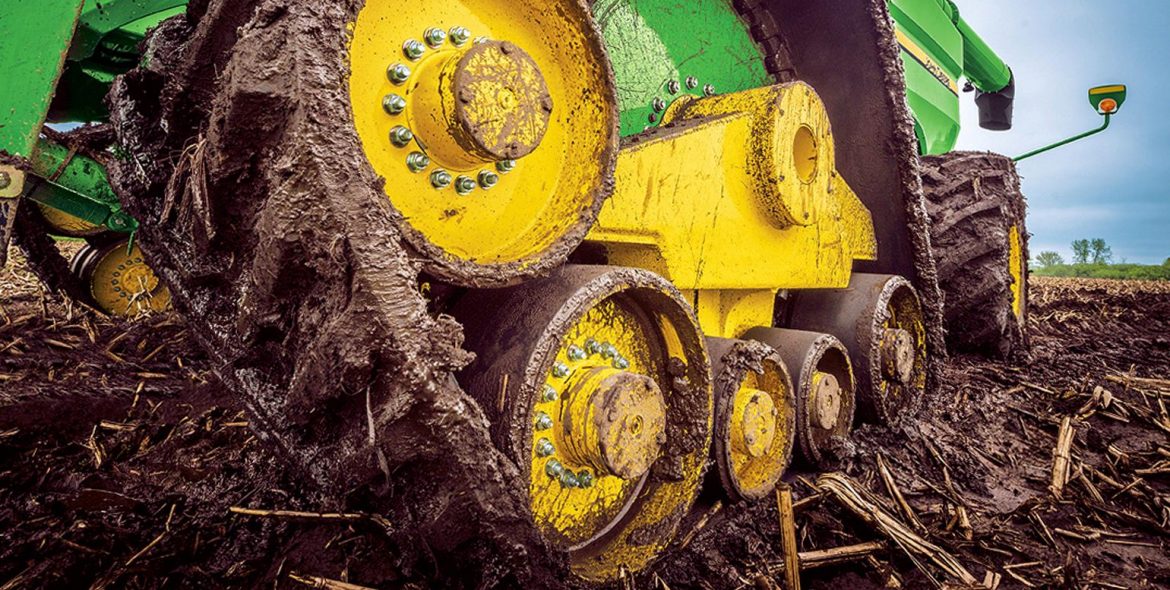A Canada field test using new technology showed how tire pressure and tracks affect top-soil stress, and how axle load impacts deep compaction.
If you believe that tracks and spray rigs floating on high-pressure tires don’t cause serious soil compaction, you’d be wrong — on both counts. That’s one of the take-homes that Advanced Ag Systems Consultant Tom Kilcer from Kinderhook, N.Y., hauled home from a compaction conference hosted by the Innovative Farmers Organization of Ontario, Canada.
The event featured Matthias Stettler, a world authority on compaction research from Bern University in Switzerland. Stettler and team unveiled technology to measure deep compaction damage caused by farm equipment.
Farmers watched as $20 million worth of equipment — combines, grain carts, sprayers, manure tankers, pickup trucks and many different tractor-implement configurations — had their compaction footprints measured as they rolled over in-ground sensors buried at 6-, 12- and 20-inch depths. They even compared tires versus tracks.
2 big surprises
Tracks weren’t the answer expected for soil compaction. They added several tons to total weight. Compaction was concentrated at the big wheels and under each of the smaller roller wheels.
Tracks and their larger soil contact area offer the possibility to reduce soil stress, acknowledged Stettler. But they’re typically used on very heavy machinery, which deliver high levels of subsoil stress despite the large contact area. Trucks with fully inflated tires running alongside harvesters add to the injury.
Another unexpected shock, according to Kilcer, was the compaction from a loaded spray rig with narrow tires at high pressure. Wider tires helped, but only if adjusted to less than 15 pounds per square inch when in the field.
Kilcer saw serious compaction from a pickup truck with a loaded 250-gallon fuel tank in back. It was running on tires with high inflation.
Tire inflation pressure is the most important factor in managing topsoil compaction, emphasized Stettler. That’s why he recommended running tires at a maximum 15 psi in the fields. He was impressed with Nuhn’s 12-tired, 47-ton slurry tanker that rolled with 10 psi tire pressure.
 NOPE, IT’S NOT FLAT: These tires are deflated to less than 15 psi to run in fields and automatically re-inflated to 35 psi for the road.
NOPE, IT’S NOT FLAT: These tires are deflated to less than 15 psi to run in fields and automatically re-inflated to 35 psi for the road.
A number of Canadian farms are installing on-the-go tire pressure systems on tractors, choppers and combines. As they pull into a field, tire pressure is dropped to less than 15 psi to make a wide flat tire. On the road, the system quickly re-inflates tires to 35 psi road pressure. Yes, that’s costly. But Kilcer insisted it’s not as costly as permanent compaction and yield loss, and it’s less costly than tracks.
Farming broken bricks?
Today’s equipment is turning the soil into bricks, according to Kilcer. “Then we buy very expensive deeper tillage tools to break up the bricks.” That’s why Canadian and U.S. farmers are putting tile lines between tile lines trying to remove water from fields increasingly compacted by larger equipment running on the wrong tires.
“Governments limit road weight to 10 tons per axle [in New York state] to prevent roads from being destroyed. Yet, too many farmers think nothing of running 18- to 20-ton choppers, or 38-ton loaded combines on living soil that deforms under pressure — with nearly all the weight on the front axle and tire pressure at 35 psi or more.”
Tire pressure controls top-soil stress, summarized Kilcer. But total load affects the more permanent subsoil stress. Total weight affects deep compaction, causing a permanent 3% loss per for each occurrence.
His bottom-line recommendation: Keep field tire pressure less than 15 psi and wheel loads less than 5 tons per axle.
For more on easing field compaction, see 2 tips to limit subsoil compaction at harvest.
This article was adapted from Kilcer’s Advanced Ag Systems newsletter at advancedagsys.com.

